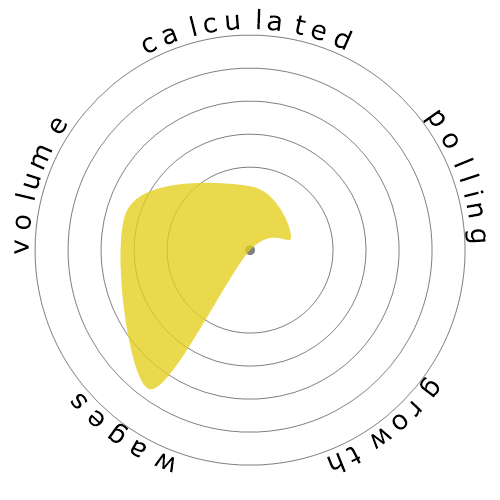Computer Programmers
Where Would You Like to Go Next?
Or, Explore This Profession in Greater Detail...


What does this snowflake show?
What's this?
We rate jobs using four factors. These are:
- Chance of being automated
- Job growth
- Wages
- Volume of available positions
These are some key things to think about when job hunting.
People also viewed
Calculated automation risk
High Risk (61-80%): Jobs in this category face a significant threat from automation, as many of their tasks can be easily automated using current or near-future technologies.
More information on what this score is, and how it is calculated is available here.
User poll
Our visitors have voted that it's probable this occupation will be automated. This assessment is further supported by the calculated automation risk level, which estimates 70% chance of automation.
What do you think the risk of automation is?
What is the likelihood that Computer Programmers will be replaced by robots or artificial intelligence within the next 20 years?
Sentiment
The following graph is shown where there are enough votes to produce meaningful data. It displays user poll results over time, providing a clear indication of sentiment trends.
Sentiment over time (quarterly)
Sentiment over time (yearly)
Growth
The number of 'Computer Programmers' job openings is expected to decline 9.6% by 2033
Total employment, and estimated job openings
Updated projections are due 09-2025.
Wages
In 2023, the median annual wage for 'Computer Programmers' was $99,700, or $48 per hour
'Computer Programmers' were paid 107.4% higher than the national median wage, which stood at $48,060
Wages over time
Volume
As of 2023 there were 120,370 people employed as 'Computer Programmers' within the United States.
This represents around 0.08% of the employed workforce across the country
Put another way, around 1 in 1 thousand people are employed as 'Computer Programmers'.
Job description
Create, modify, and test the code and scripts that allow computer applications to run. Work from specifications drawn up by software and web developers or other individuals. May develop and write computer programs to store, locate, and retrieve specific documents, data, and information.
SOC Code: 15-1251.00
Comments (285)
Please take into account the trajectory of progress rather than the current state of things.
But though AI (= LLMs) has gotten better in the sense of creating more complex outputs, it otherwise suffers from exactly the same problems as early versions: no compositionality, no continual learning, no consistency, and no self-correction.
If you ask it to fix a certain bug fix in a complex codebase, you have a high chance that it also starts to change something completely unrelated. It doesn't really grasp how precisely elements make up the complex whole; instead, it applies pattern-matching, by which it gets misled. You can waste days with AI on what would be a five-minute manual fix.
Also, junior devs' job isn't to churn out mediocre code for generic, long-solved tasks or create the 1000th to-do list app. Instead, they get onboarded and are supposed to familiarize themselves with your codebase to improve it. But you know that "PT" in ChatGPT stands for "pre-trained?" So AI doesn't learn anything new. AI is like suffering from anterograde amnesia.
Anyway, neither apps nor code are like a commodity where "more is better". In the end, the point is to create something new. Otherwise there is not much point: just use an already existing and tested library. And it's exactly the "new" part where AI sucks because it struggles to transcend its training data.
So no, AI is incapable of replacing junior devs.
It would have a lot of immediate positive effects if AI worked like you describe: it would insanely empower open-source projects (often lacking maintainers) to fix all their long lists of bugs or introduce new features. But this is not what we observe at all. Because AI is overhyped and underdelivers.
-> MNCs keep laying off juniors while recording profits. Why? Because they have trained their AIs to do the jobs of 100s of people. Where they needed 100 people, they only need 1 now.
-> OpenAI just hired ex-bankers to develop financial AIs that will eventually replace junior finance professionals in their company. Others are following suit.
-> Salesforce has openly admitted to cutting jobs because of AI. So have many other top companies.
Don't get me wrong, I think AI is way off from completely replacing digital labour. I almost agree with you on most of your points.
But it's getting there, and it's getting there quickly. It's only a matter of time until researchers develop a new system that supersedes transformer models. And judging by the Billions being burned every day on AI research, it's almost inevitable.
I think you'll find the "AI 2027" paper very interesting. Please do have a read. And thanks for your reply :)
For instance, I asked ChatGPT to write me a simple code that creates a "conversation" with OpenAI's APIs. It could not even do that accurately.
Current likelihood of replacing a computer programmer is laughable at best. Maybe over 20 years there might be "some" progress.
Reply to comment